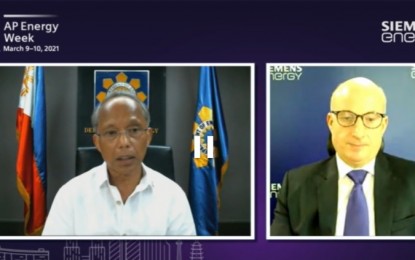
DECARBONIZATION EFFORTS. Energy Secretary Alfonso Cusi (left) joins a panel session of the Asia Pacific Energy Week organized by Siemens Energy on Tuesday (March 9, 2020). Cusi discusses the Philippine government efforts to reduce carbon dioxide emission without implementing carbon tax. (Screengrab from Siemens Energy AP Energy Week)
MANILA – The Philippines is not yet ready to impose carbon tax as a move to reduce carbon dioxide emission particularly in the power sector, the country’s top energy official said.
At the virtual panel session of Asia Pacific Energy Week organized by Siemens Energy Tuesday, Department of Energy (DOE) Secretary Alfonso Cusi said it is not yet the right time to impose such a tax as this will only make the country’s power sector to become more uncompetitive.
Cusi added the country is still building its capacity to meet power demand and ensure sufficient reserve.
Since he assumed office, the DOE has been pushing for technology-neutral policy, welcoming investments in all potential sources of energy to build capacity for the country amid the increasing power demand.
“And up to this moment, we still want to build capacity. So carbon tax for us at this moment, we’re not just ready for that,” he said.
Cusi said burdening power generation companies with carbon tax will only make the Philippines uncompetitive in attracting investments in power generation.
“We are a victim, I’ve been saying that the Philippines is a victim of climate change and what I’m asking is climate justice. So we need support so we can transition properly,” he added.
Instead of imposing a carbon tax, the DOE chief said the country is exploring nuclear as a new energy source.
“We have to bring down the cost, reduce cost, and ensure good supply. This can be best answered by nuclear,” he added.
The government would also like to see more investors to locate in the Philippines, especially those advocating renewable energy (RE), Cusi said.
He added RE integration is also crucial as part of the efforts for decarbonization hence, the DOE is pushing for the development of hydropower, geothermal, and other indigenous energy resources.
“The Philippines is one of the least contributors to carbon emission but in spite of that, we are doing our duties to help save our environment,” Cusi said. (PNA)
